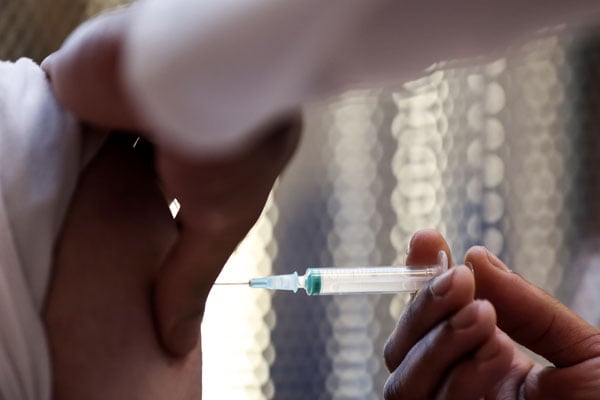Prime
How govt handles expired, wasted vaccines

Illustration picture shows Nuvaxovid vial pictured during the start of vaccination with the Nuvaxovid vaccine, at the Pacheco test and vaccination centre in Brussels on March 3, 2022. The Nuvaxovid vaccine of Novavax is offered to people at high risk of allergic reactions to the available corona vaccines, or to people who have experienced side effects after a first shot. PHOTO/AFP
What you need to know:
- According to WHO, the cost of destroying a kilogramme of medical wastes ranges from$2.2 (Shs7,973) to $8.2 (Shs29,721) across the world.
Low uptake, short shelf-life and poor storage facilities are significantly affecting vaccination drive, increasing risks of expiry of the life-saving jabs.
Ingredients in expired or wasted vaccines could be useless, potentially leaving people vulnerable to the disease they are supposed to be protected against.
The Global Alliance for Vaccines and Immunisation (GAVI), for one, says such ingredients have the potential of becoming harmful.
Before destroying nearly 400,000 doses of expired Covid-19 vaccines in January, the Health Ministry was keen to tell Ugandans that the process would be subjected to best practices under the stewardship of the National Drug Authority (NDA) and the National Medical Stores (NMS).
Ms Sheila Nduhukire, the NMS spokesperson, told Saturday Monitor that the handling of expired or wasted vaccines starts with the alert from the affected districts.
“NMS distributes to the districts, then the districts store those vaccines. If the vaccine expires in the district, the district has to notify us, that is when we can act together with the National Drug Authority,” she said.
Mr Abiaz Rwamwiri, the public relations manager of the NDA, told Saturday Monitor that expired drugs are usually destroyed at the NDA-accredited facility in Nakasongola District.
“The cost of destroying the drug is extremely high but it depends on where we find it [the product that will be destroyed]. If we confiscate drugs from drug shops, those we destroy at our own cost. But if it is a donation—when vaccines come through Global Fund—we charge Global Fund for destroying the expired drugs,” he said.
He added: “But much of the drugs that expire [or get wasted] are those that have been stocked poorly or by small operators and so we end up incurring those costs. You don’t just go and burn. They are destroyed very carefully; otherwise they are poisonous to the environment.”
The NDA guidelines for disposing of expired or wasted pharmaceuticals (drugs and vaccines) and other substandard pharmaceutical products present a serious threat to public health and to the environment.
“Their elimination from the public and subsequent disposal is embedded in NDA’s mandate of ensuring that only safe, efficacious and quality drugs are availed to the entire population of Uganda,” the guidelines read in part.
But according to guidelines from the World Health Organisation (WHO), “liquid pharmaceutical waste may be disposed of using the cement encapsulation procedure, high-temperature incineration or in cement kilns.”
The guidelines further read: “It is not acceptable to discharge liquid pharmaceuticals, diluted or not, into slow-moving or stagnant surface water.”
According to WHO, the cost of destroying a kilogramme of medical wastes ranges from$2.2 (Shs7,973) to $8.2 (Shs29,721) across the world.
Following the low uptake of Covid-19 jabs after Uganda came out of its third Covid wave in January, the country is widely expected to dispose of several vials of vaccines in the coming weeks. This comes as vaccination numbers remain disappointingly low.
NDA procedure
1. Original letter requesting for destruction is presented to the NDA together with a detailed list of the obsolete items to be disposed of.
2. After inspection and assessment by an official of the NDA, if the pharmaceutical waste is 100kg or less, the client is given a bank slip to go and pay for the weight specified.
3. After payment, the expired items are kept in the NDA “expired drugs store”.
4. If the pharmaceutical waste is more than 100kg, the client is advised to contact the NDA accredited service providers for the destruction. In such an instance, the NDA shall provide an Inspector of Drugs who will supervise the safe disposal of the expired pharmaceutical waste.
5. NDA charges a fee per hour for the supervision of safe disposal of pharmaceutical waste.




